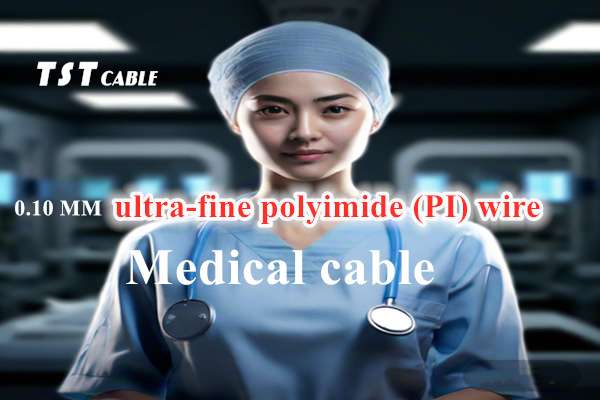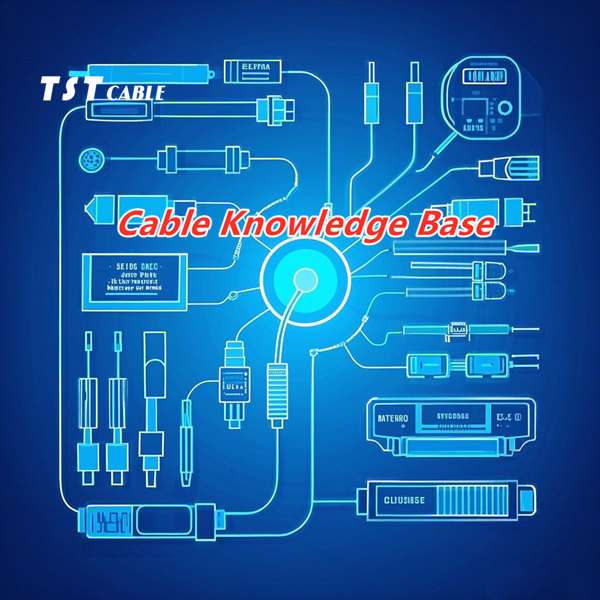
In the medical field, precision and reliability are the eternal pursuit of mankind. Today, an exciting innovation is quietly changing the pattern of medical wires – thinner extruded polyimide wires, bringing new possibilities to the medical industry.
Medical wrapped polyimide wires have always played an important role in medical equipment. However, with the continuous advancement of technology, we have found a better choice – 0.10 MM extruded polyimide wire. This new type of wire, with its advantages of good density and airtightness due to the characteristics of the production process, can make the insulation layer thinner, and the entire cable can be thinner and smaller, and also show excellent performance, and is gradually becoming a new favorite in the medical field.
In the medical field, especially in surgical operations, the quality and technological innovation of medical sutures are crucial to the success of the operation and the recovery of patients. With the development of technology, the application of new materials has gradually become an important trend in the medical industry. As a high-performance polymer, polyimide (PI) is widely used in many industrial fields due to its excellent physical and chemical properties, such as high temperature resistance, corrosion resistance, and high mechanical strength. When it comes to the application of thinner extruded polyimide wire in the medical field, we can expect the following advances:
Minimally invasive surgery: 0.10 MM polyimide wire can support more delicate operations, which is particularly important for minimally invasive surgery. Minimally invasive surgery can reduce the area of trauma, reduce the risk of infection, and help patients recover quickly.
Improved precision: In cases where extremely high precision is required, such as ophthalmic surgery or neurosurgery, the use of thinner sutures allows doctors to operate more accurately and reduce the impact on surrounding healthy tissues.
Biocompatibility: New polyimide wires may undergo special surface treatments or add biocompatible substances to make them more suitable for the human environment and reduce rejection reactions.
Strength and flexibility: By adjusting the formulation or manufacturing process of polyimide, sutures with higher strength while maintaining sufficient flexibility can be produced, which is particularly important for wound healing in areas that require long-term support or frequent movement.
Absorption properties: For some types of polyimide threads, their absorbable properties may also be developed, so that the sutures can be naturally decomposed and absorbed in the body without the need for secondary surgery to remove them.
It should be noted that although polyimide threads perform well in other industrial applications, they must undergo rigorous clinical testing and approval processes before being used in the medical field to ensure that their safety and effectiveness meet medical standards. In addition, the introduction of any new material requires a comprehensive consideration of the cost-effectiveness ratio to ensure that the new technology can benefit a wider range of patients.
The new changes in medical threads, especially the application of 0.10 MM extruded polyimide threads (PI threads), represent a leap forward in surgical technology. Polyimide is a material with high strength, heat resistance, chemical stability and good biocompatibility, which makes it one of the ideal choices for manufacturing high-quality medical threads. Here are some possible changes and improvements:
1. Higher precision and flexibility
0.10 MM thinner polyimide thread can provide higher flexibility and better maneuverability, which is especially important in complex minimally invasive surgery. Thinner thread can achieve more delicate sutures, reduce damage to surrounding tissues, and help improve surgical precision.
2. Better biocompatibility
With the advancement of material science, polyimide threads can be designed to have better biocompatibility, which means they can work better in the body environment and reduce the risk of inflammation and other adverse reactions.
3. Absorbability
In some cases, polyimide threads may be designed to be absorbable. This means that they can degrade and be absorbed by the body after completing the suturing task, without the need for another surgery to remove them.
4. Antimicrobial properties
New polyimide threads may contain antimicrobial ingredients or be treated with antimicrobial agents, thereby reducing the risk of postoperative infection.
5. Durability and Strength
Even at a very thin 0.10 MM, polyimide thread can maintain high strength and durability, which is very important in suture applications that require long-term support.
6. Significantly improved patient experience
Since 0.10 MM thread can reduce the area of trauma and promote a faster recovery process, patients’ postoperative pain and recovery time may be significantly improved.
7. Innovation and integration
As technology develops, polyimide thread may also be integrated with other innovative technologies, such as smart sutures, which can monitor wound healing or release drugs.
Nevertheless, these new changes need to undergo rigorous research, testing, and approval from regulatory agencies before they can be actually applied. Only in this way can we ensure that these innovations truly benefit patients while also ensuring the safety and efficiency of medical workers.
8. Customized solutions
With the development of 3D printing technology and personalized medicine, future polyimide threads may be customized according to specific surgical needs. This means that doctors can design the most suitable suture solution according to the patient’s specific situation, further improving the treatment effect.
9. Versatility
Future polyimide wires may integrate multiple functions, such as combining sensor technology to monitor physiological parameters such as wound healing progress and temperature changes. Such multifunctional wires can provide real-time data to medical teams, helping them better manage the patient’s recovery process.
10. Education and training tools
Thinner and easier-to-operate polyimide wires can also be an important tool in surgeon training. They allow doctors to practice more complex surgical techniques in a simulated environment, thereby improving surgical skills and performing more confidently in real surgeries.
11. Economic benefits
Although the initial R&D costs are high, in the long run, the use of more efficient medical wires can reduce the incidence of complications, shorten hospital stays, and speed up patient recovery, thereby reducing overall medical costs.
12. Environmental friendliness
With the promotion of the concept of sustainable development, the production and disposal of new polyimide wires will also take environmental protection factors into consideration. For example, recyclable or biodegradable materials can be used to reduce the impact on the environment.
13. International cooperation
The advancement of medical technology is often accompanied by international cooperation, and researchers and medical institutions in different countries share research results, accelerating the process of new technologies from laboratory to clinical application. This also means that we may see more international cooperation projects on the research and development of polyimide wires in the future.
Advantages and experimental data comparison of wrapped PI wire and extruded PI wire
Why can 0.10 MM ultra-fine extruded PI wire replace wrapped PI wire? Next, TST CABLES will analyze the unique advantages of extruded PI wire through experimental tests. Ultra-fine extruded polyimide wire has many advantages. First of all, it maintains the excellent properties of polyimide materials while achieving a slimmer size. This means that in medical equipment, it can take up less space, providing strong support for the miniaturization and refinement of equipment. Whether it is a precision medical device or a portable diagnostic device, thinner wires can be easily integrated into it without affecting the overall performance of the device.
Its excellent mechanical properties are remarkable. In a medical environment, wires may be subject to various external forces pulling and bending, while extruded polyimide wires have excellent strength and toughness, and can withstand these challenges without breaking easily. This not only ensures the stable operation of the equipment, but also reduces the maintenance costs and downtime caused by wire damage.
Its smooth surface and scratch resistance are also its highlights. In medical places, wires often come into contact with various objects and are easily scratched. Extruded polyimide wires can effectively resist scratching, keep their appearance intact, and extend their service life. Whether in a busy operating room or in a daily ward environment, it can always maintain reliable performance.
Its chemical resistance makes it a natural choice in the medical field. Various chemicals and disinfectants are often exposed during medical treatment, and traditional wires may be corroded and affect their performance. Extruded polyimide wires have excellent density and airtightness, and have good tolerance to a variety of chemicals, ensuring stable operation in various complex medical environments.
High temperature stability provides a guarantee for the safe operation of medical equipment. In some special medical operations, the equipment may generate higher temperatures. Thinner extruded polyimide wires can remain stable in high temperature environments, and will not experience performance degradation or safety hazards due to temperature increases.
In addition, the characteristics of low dielectric loss are crucial for some medical devices that need to transmit high-frequency signals. Extruded polyimide wire performs better in this regard. It can ensure the quality of signal transmission and the accuracy of medical diagnosis and monitoring.
Comparison of wrapped PI wire and extruded PI wire test
| Category | Conductor diameter (mm) | Finished product outer diameter (mm) | Insulation thickness (mm) | Scratch resistance (10N) | Elongation (%) | Withstand voltage (Kv) | Insulation resistance (MΩ/Km) |
| Wrapped PI wire | 0.50 | 0.97 | 0.235 | 178 | 31.2 | 10.0 | 2332 |
| Extruded PI wire | 0.40 | 0.60 | 0.10 | 5100 | 37.7 | 12.0 | 10800 |
From the above comparison data, it can be seen that despite the greatly reduced thickness of the insulation layer, the various performances of the 0.10 MM extruded cable can still be improved, which shows the advantages of thinner extruded cables.
[Innovative medical treatment, fine suture – TST CABLES new generation of extruded polyimide wire]
Leading the future medical trend, TST CABLES proudly launches 0.10mm thinner and stronger extruded polyimide suture. This high-tech product combines advanced material science and precision manufacturing technology, and is designed for medical professionals who pursue the ultimate surgical effect. Its excellent flexibility and strength not only ensures precise control during surgery, but also effectively promotes wound healing and reduces patient pain. It is suitable for a variety of complex surgical scenarios, whether it is minimally invasive or traditional open surgery, it can show extraordinary performance. Choosing TST CABLES’s polyimide suture is to choose reliability and progress, making every suture a model of the perfect fusion of art and science. Choosing a thinner extruded polyimide wire is to choose higher quality and more reliable performance, which can completely replace the wrapped polyimide wire. It brings new opportunities and challenges to the medical industry and drives medical technology forward. Let us welcome this change in medical wires together and provide patients with more accurate and safer medical services.
If you have customized 0.1mm ultra-fine extruded PI cables, DC cables, AC cables, low-smoke halogen-free cables, high-temperature cables, coaxial cables, UL cables, Teflon wires, armored wires, industrial cables, power cables, control cables and other products, and need further technical support or cable solutions, you can always send an email to the professional cable engineer of TST cable manufacturer (email: lixiangchao@testeck.com, please state your country, your industry, and your needs in the email, we can provide you with free samples)
Also available in:
English




